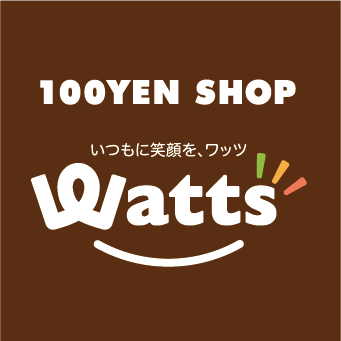
-
Watts
Pursuing the potentiality of one coin
In Japan, the idea of "selling goods at a single price" was prevalent in Edo (old Tokyo) from 1722 to1723 and as an example before the World War II, Takashimaya nation-widely developed "10 sen shop”, which was similar to the current 100 yen shop. “10 sen” was an old Japanese one coin, which is equivalent to 1/1000 worth of the current 100 yen.
This time, Franchise Japan visited the overseas business division of WATTS to ask about the future trend of “100 yen shop”.
Retail package business spreading from Japan to overseas

Today, 100 yen shops in Japan are oligopolized by four major companies including the leader company DAISO and Celia, Cando, Watts.
Regarding the number of shops in Japan, it seems to be almost saturated but each company keeps its growth rate at 2% every year by taking advantage of its own characteristics.
WATTS directly operates the shops, but not by means of franchise-operation.
We will continue to focus on overseas expansion in the future and mainly offer our products and sales know-how to overseas partners rather than license business. With the partners, we are promoting businesses each other while envisioning the synergy effects and the possibility of long-term business continuity.
With such a business model, we are pursuing the possibility of transition to license agreement.
However, the partner has made a great success with its own brand over a few years and the supply of goods works well, in this case, even if we propose the deployment with WATTS brand, such proposal is often be refused.
Currently, our products are well received in China, Myanmar, Mongolia, Laos, Singapore, Brunei, Korea, Taiwan, Cambodia, India, Mexico, Philippines, New Zealand, Australia and we have good relationships with our partners as a wholesaler.
As an overseas brand, WATTS Group has been operating “KOMONOYA” since June 2009, and we plan to further expand customer’s developments in Southeast Asia.
In the form of capital alliance, we have established Shanghai Watts Trade and Sales Co.,Ltd. in Shanghai, China and established Watts Peru SAC in Lima, Peru.
Unfortunately, we sold a Malaysian joint venture a few years ago.
In Thailand, a Japanese staff stays for the shop operation. We have 2 Japanese staff and 30 local staff in Shanghai. The shops in Peru are operated by 1 Japanese staff and 100 local staff.
Issues and advantages of 100 yen shop

First of all, the principle of our industry is the large number and volume.
It is difficult to deal as an individual business because colour variations of each product and buying all goods beforehand will be required.
From this fact, the number of independent companies declined and chain-shops became mainstream.
In the past, it was dominant to purchase cheaply purchasable financial products and disposal items, but such business declined by 2010. By making full use of the sales force of a large number of shops and entrusting mass production of private products/brands to Japanese and overseas suppliers, the discount of purchase price and the quality of products are ensured. On the other hand, as a result, inventory costs become huge.
Recently, we also have received offers from companies in USA who are seeking Made in Japan and gradually expand overseas developments, but it takes several years to grasp each local market, and sometimes the business type does not fit locally, therefore we do not directly advance overseas so far.
This business takes quite a lot of time until a contract is established. However the retail package has been completed, so it can be said that the advantage is a quick start of local shops soon after the business contract.
In addition, the know-how is the product offering and operation itself, and it is said as the atmosphere of a 100 yen shop will not come out without using Japanese racks and setup for it’ display.
At the same time, in any country, the necessary employees will be only one manager and others are part-time workers, which can reduce the personnel expenses.
It is also a remarkable point that many items on the shelf are voluntarily suggested by product suppliers.
Future Business Model

100 yen shop has a characteristic which is difficult to be established in the e-commerce business.
The shipping fee effects so much.
That’s say, the delivery of goods will cost much more than the product price itself.
There is a difficulty in selling through the net-business.
Because even at a small 100 yen shop, at least 5,000 kinds of products are available.
It may be impossible for customers to choosing a large number of products by browsing on the Internet.
For realizing unattended shops, it is necessary to organize so many matters, so it can be said that the business will not be valid.
For example, it is true that there are few applicable products for confections and foods sold at a low profit margin.
Currently, 50% of the products are produced in China, 40% in Japan, 10% in ASEAN.
In Japan, customers from western countries seem to purchase souvenirs and Asian customers get dairy use items.
Actually, the consumer target in our industry consists of 80% female customers.
The average number of purchased items is 3 to 5 per customer in any country.
In recent overseas trends, there are an increasing number of large stores consisting of Glossary Space 1/3, Cosmetic Space 1/3, 100 Yen Shop Space 1/3.
The large stores will be possible in the countries where the living by car is essential, such as USA, Australia and UK.
We are good at relatively small shops with high profitability.
In the future, we will also target the countries with high population density such as Indonesia. We would like to promote our overseas expansion while adapting WATTS 100 yen shop business to the local needs in each country.
